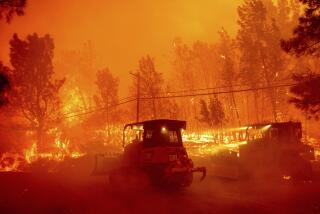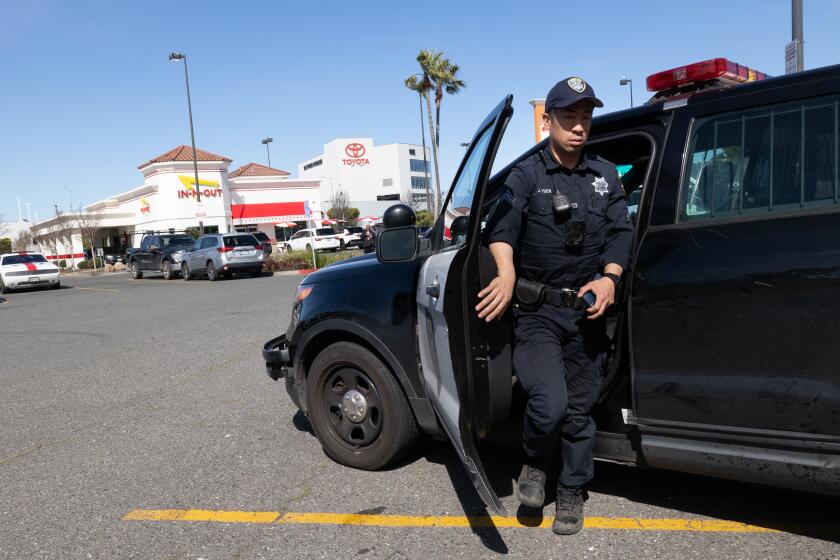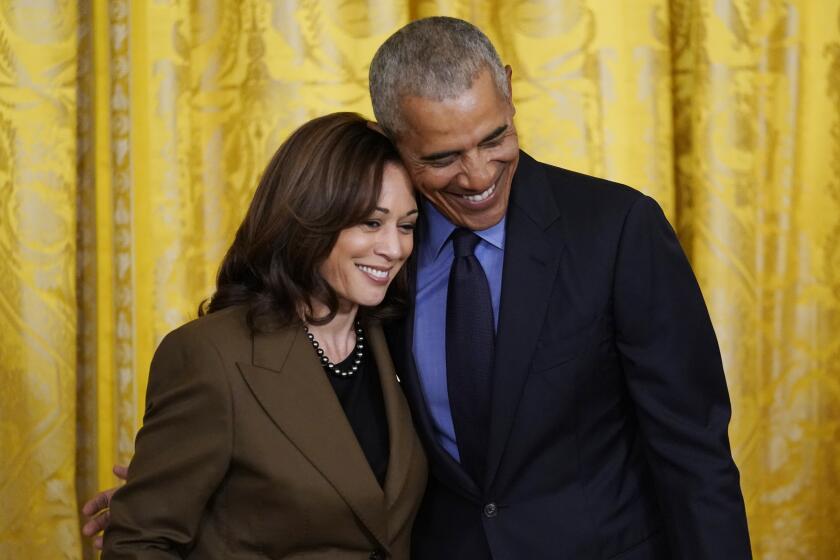State Prosecutors Protest to Press Their Case Against Pay Cuts
Deputy California Atty. Gen. Robert Henry wants to ensure that Douglas Clark dies in the gas chamber for the Sunset Strip slayings of six women during a murder rampage in 1980.
Henry’s colleague William H. Davis Jr. devotes much of his time on the job to trying to uphold the conviction of San Nam Chinh, sentenced to life in prison for the fatal shooting of a Los Angeles police officer during a 1984 aborted robbery of a Chinatown jewelry store.
Both cases are on appeal.
But on Wednesday, Henry and Davis, and about 100 other state prosecutors, put their legal briefs aside to demonstrate in downtown Los Angeles.
Their goal: to put some of Gov. Pete Wilson’s proposed spending cutbacks on ice.
They fear that the cutbacks, if approved by the Legislature, would cost them and other state employees more than 15% of their salaries.
The prosecutors marched in front of the Ronald Reagan State Office Building on Spring Street, where the governor has an office. They, and 200 other state employees who joined in, carried placards bearing such messages as “Punish Criminals, Not the Prosecutors” and “Wilson Is Taking Bread From the Tables of Our Families.”
Deputy attorneys general earn between $35,500 and $85,500 a year, a spokeswoman said.
The suit-and-briefcase types are hardly the kind that usually protest government policies. But many said they will be forced to look for work at private law firms if the governor’s proposal is approved by the Legislature. They also threatened to organize a walkout of all state employees.
A spokesman for the prosecutors said the proposed cuts would unfairly “tax” state employees to help balance the state’s teetering budget.
Davis proposed a tax on the rich instead.
“Wilson claims he’s a death penalty supporter, yet we’re the people who have to take these cases to the (state) Supreme Court,” the deputy attorney general said. “We’re the attorneys who have to protect the environment, the public safety.”
State prosecutors handle a variety of civil and criminal cases, including death penalty cases, which are automatically reviewed by the California Supreme Court. It is their job to make death sentences stick.
But a Wilson spokesman said the governor would not back away from his proposed spending cuts.
“The governor doesn’t react to threats,” said Franz Wisner, Wilson’s deputy press secretary. “He has proposed a sound, fair plan for all Californians.”
The demonstration began at noon with the precision of a court hearing. Henry handed out placards to anxious protesters, who began marching and chanting “No More Cuts.”
Deputy Atty. Gen. Don Robinson, one of the demonstrators, said he is handling a lawsuit aimed at cleaning up the Stringfellow acid pits in Riverside County.
The state and federal government sued various companies that sent waste to the site to force them to pay for the cleanup of toxic chemicals, estimated to cost from $200 million to $800 million, Robinson said. Those firms filed a countersuit to avoid paying for the cleanup. A trial is scheduled for April, 1992, in U.S. District Court in Los Angeles.
Robinson, picketing in a gray suit and red tie, said he was demonstrating because he could not make ends meet if his salary were slashed. The 44-year-old San Pedro resident said he would consider looking for work elsewhere to support his wife and three children.
“I like representing the public, but I can’t afford that type of pay cut,” he said.
Deputy Atty. Gen. Alan Hagar, 47, said he finds himself in a similar situation with two teen-age children and a house in Northridge.
Hagar is representing the state in a lawsuit that arose from one of the most heated environmental debates in California in the last decade.
Arco sued the State Lands Commission in 1987 over the right to drill for offshore oil. A Superior Court judge in 1990 denied Arco’s request to enable it to develop an oil field in state waters near the University of California, Santa Barbara. An appeal is pending.
More to Read
Sign up for Essential California
The most important California stories and recommendations in your inbox every morning.
You may occasionally receive promotional content from the Los Angeles Times.






